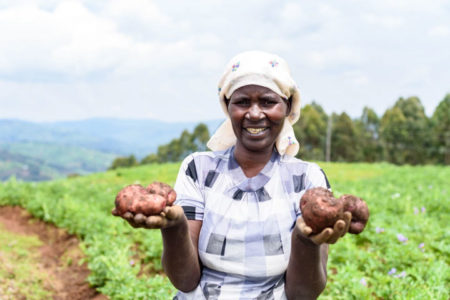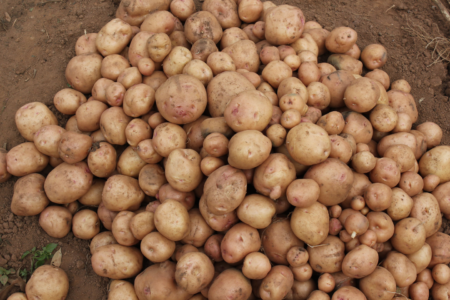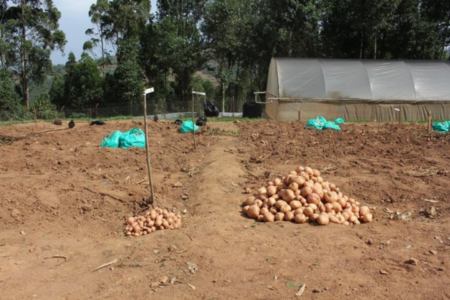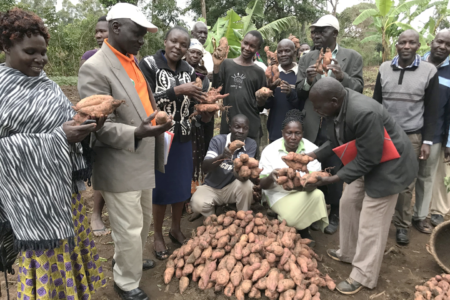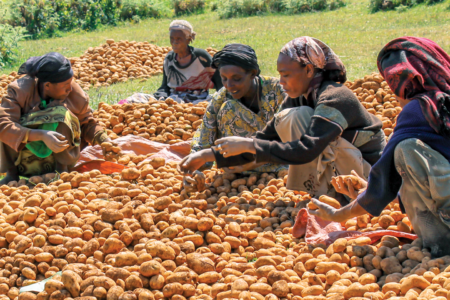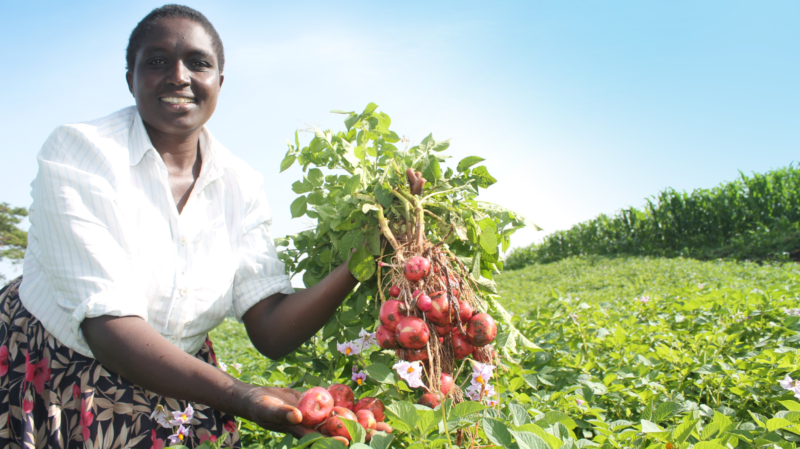
CIP is working in East Africa to breed varieties of potatoes that combine three forms of resistance to late blight — the disease that can exact costly tolls on smallholding farmers.
Background
Late blight disease—caused by Phytophthora infestans—is a major constraint for potato farmers, costing them an estimated USD 3-10 billion per year globally. In Uganda, where about 300,000 smallholder farmers grow potatoes, the disease can destroy as much as 60-100% of the crop. Due essentially to diseases such as late blight, potato yields are four times lower on average in developing countries
compared to the yields in industrialized nations.
Farmers commonly use fungicides to control late blight, but because the cost of these agrochemicals can represent 10 to 25 percent the total value of a farmer’s potato harvest, their use significantly reduces family incomes and their application poses risks to humans and the environment.
Over the years, breeders have crossed potatoes with wild relatives to produce late blight-resistant varieties, but those varieties lacked other traits people wanted or had moderate levels of resistance, so adoption was limited. However, the late blight’s rapid evolution overcomes many of these resistant varieties. This situation leaves farmers with no option but to grow varieties with little or no resistance to the disease if there is a strong market for them – even if it means they have to spend a significant portion of their earnings on fungicides to ensure a good harvest. In response, International Potato Center (CIP) scientists have taken a new approach using bioengineering to transfer resistance genes from potato wild relatives into varieties that are already popular with farmers and consumers.
Objectives
To develop and deliver bioengineered potatoes completely resistant to late blight to reduce the costs associated with potato production, the losses caused by the disease, and farmers’ exposure to harmful chemicals.
Approach
Targeting East African potato growing countries like Kenya, Rwanda and Uganda, CIP scientists have bioengineered four locally-grown potato varieties with three resistance (3R) genes. Working closely with Uganda’s National Research Organization (NARO), early research on these varieties has observed complete resistance to disease for the last five seasons.
In 2008, scientists at the CIP laboratory in Peru transferred three resistance genes from Mexican and Argentinean wild species into Victoria, a farmer-preferred potato variety in Uganda. Over the next four years, numerous greenhouse tests identified the most productive and diseaseresistant varieties. The bioengineered potatoes were then transferred to the CIP team in Kenya where more laboratory and greenhouse tests were conducted. In 2015, the bioengineered potatoes were then transferred to Uganda and planted in experimental trials by NARO for five seasons.
CIP and NARO have operated in full compliance with regulations from phytosanitary and biosafety regulatory agencies in Kenya and Uganda.
Confined field trials conducted at NARO’s Kachwekano Zonal Agriculture Research Institute showed that the bioengineered Victoria is completely resistant to late blight, surviving exposure to the pathogen, which destroyed conventional potato plants growing nearby.
In 2017, CIP and NARO began collaborating on compulsory assessments of the possible human and environmental risks that are required by Uganda’s National Biosafety Committee. Confined fields were established, and initial trials completed near Fort Portal (Rwebitaba), Mbale (Buginyanya), and Kabale (Kachwekano).
After two seasons of field trials in the three locations, results will be compiled and submitted to Uganda’s National Biosafety Committee as part the process to approve the market release of the Victoria variety. Stewardship and commercialization plans of this future product will be developed with national partners according to existing legal regulations.
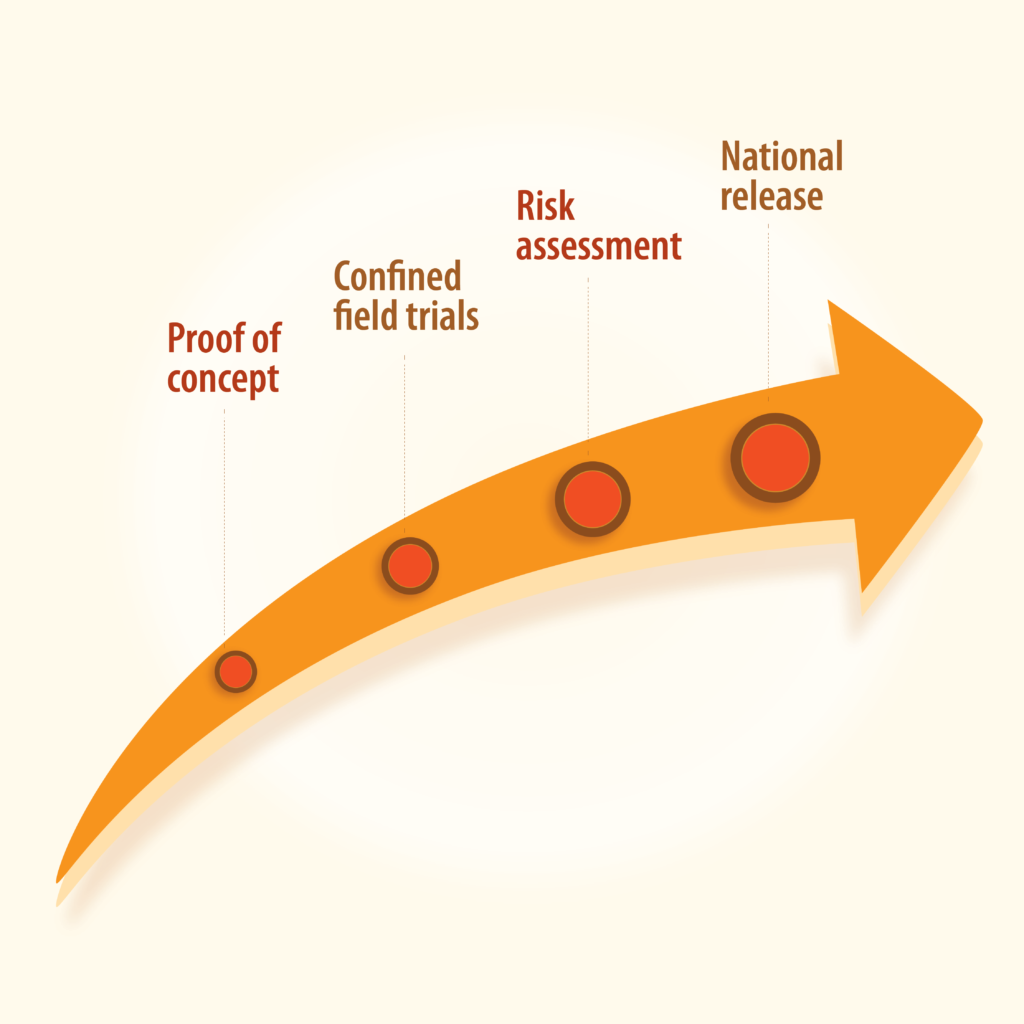
If released to the market, Victoria will benefit smallholder families through higher potato yields, lower production costs, and without exposure to harmful fungicides.
Achievements to date
Five years of field trials in multiple locations across Uganda offer strong evidence that this bioengineered Victoria potato is virtually 100 percent resistant to late blight disease and requires no chemical spraying. Because it possesses three resistance genes acting in concert, we expect the bioengineered Victoria to hold this resistance to late blight for many years.
In the field trials, the bioengineered Victoria potatoes were cultivated without fungicides, while non-bioengineered potatoes were rapidly killed by late blight disease. Farmers who were given the opportunity to visit the fields were impressed by the ability of the well-known Victoria to withstand late blight disease without chemicals.
These bioengineered potatoes can be cultivated not only in East Africa (Kenya, Rwanda, and Uganda) but also in other African countries, such as Ethiopia, and Nigeria, where CIP intends to test them with national agriculture research partners.
Key outputs, outcomes and targets
| Outputs | Outcomes | Targets |
| Bioengineered potato varieties for African countries with complete and durable resistance to late blight disease. | Farmers grow potatoes with higher yields, for less money, and without exposure to harmful synthetic fungicides. | Bioengineered varieties to cover 30-40% of the total potato area in countries 15 years after release. |
Contact
Marc Ghislain
CIP, Kenya
m.ghislain@cgiar.org
Thanks to our donors


